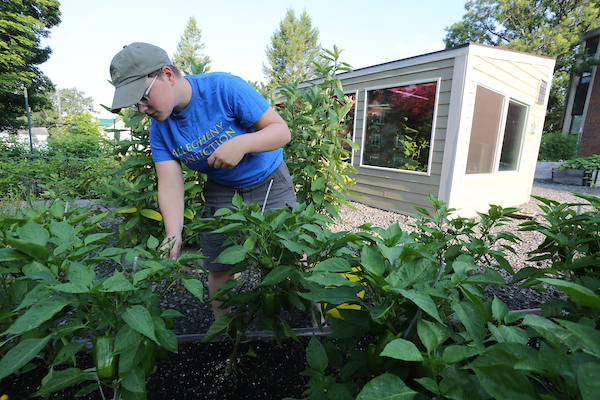
A national organization has certified that produce coming from Allegheny College’s Carrden is grown without pesticides and herbicides and meets all organic agriculture standards.
The Carrden and all its tasty produce sprouting near Carr Hall is now Certified Naturally Grown, and was certified as such in early June. A Saegertown-area certified organic farmer inspected the garden and its surroundings and confirmed its conformity to the national guidelines, said Kerstin Ams, Allegheny’s garden manager.
Certified Naturally Grown (CNG) is a national organization that offers peer-review certification to farmers and beekeepers producing food for their local communities by working in harmony with nature and without relying on synthetic chemicals or GMOs. The group’s standards are based on the ideals of the organic movement, and its mission is to support its members by promoting sustainable agriculture through peer-review certification, grassroots networking, and advocacy.
“CNG is a certification, in some ways similar to U.S. Department of Agriculture Organic, that we received,” said Ams. “It represents our sustainable growing practices and commitment to continuing to improve these practices.
“Students in my Small-scale Production Agriculture course in spring 2017 researched many different certifications and recommended we pursue CNG. In 2018-19, a student completed the application, and we just got inspected and passed in June,” Ams said.
Besides yielding organic produce, the 3,000-square-foot Carrden is a “great teaching tool,” said Kelly Boulton, Allegheny’s sustainability coordinator. “Students used to learn about organic agriculture theoretically, but now they’re experiencing firsthand what it takes and what organic farming means. And we get all this great food for our dining halls,” she said.

Recent Allegheny graduates Laura Allston, top photo, and Rowan Baxter-Green, photo above, work in Allegheny College’s Carrden in 2018. Photo Credit: Ed Mailliard
Earning the certified naturally grown accolade also fits with the college’s overall sustainability objectives, said Boulton. “It blends with how we manage our entire campus grounds, using no chemicals and employing closed-loop composting. The designation further confirms our culture of sustainability,” she said.
The Carrden was established in 2013 to provide fresh food to the Allegheny campus and local community. Students grow a variety of produce, herbs, and even some fruit. A greenhouse was added in 2016. “CNG’s mission of empowering small-scale farms through grassroots accountability of quality and organic products aligns with our values,” Ams says.
Ams and Boulton shared some further news: Coming to the Carrden this summer will be a colony of bees and about a half-dozen chickens to diversify the gardens and organic offerings, pending administrative approval.
The bees will produce honey and beeswax, and pollinate the plants. The chickens will help manage insects and weeds and lay a few eggs. The chickens will be enclosed so they don’t wander far from the gardens, and a glass wall will be erected near the beehives to force the apiary residents into flight paths over people walking nearby, Ams said.


